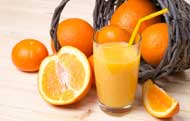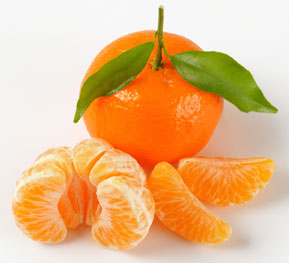





1. Mandarine Facts
2. Types of Mandarines
3. Nutritional Value of Mandarines
4. Health Benefits of Mandarine
A mandarin orange (Citrus reticulata), often simply called mandarin, is a small, rounded citrus tree fruit. Treated as a distinct species of orange, it is usually eaten plain or in fruit salads. The mandarin is small and oblate, unlike the roughly spherical sweet orange (which is a mandarin-pomelo hybrid). The taste is sweeter and stronger than the common orange. A ripe mandarin orange is firm to slightly soft, heavy for its size, and pebbly-skinned. The peel is thin and loose, with little white mesocarp, so they are usually easier to peel and to split into segments. Hybrids have these traits to lesser degrees. The mandarin orange is tender and is damaged easily by cold. It can be grown in tropical and subtropical areas.
According to genetic studies, the wild mandarin was one of the original citrus species; through breeding or natural hybridization, it is the ancestor of many hybrid citrus cultivars. With the citron and pomelo, it is the ancestor of the most commercially important hybrids (such as sweet and sour oranges, grapefruit, and many lemons and limes). Though the ancestral mandarin orange was bitter, most commercial mandarin strains derive from hybridization with the pomelo, which gives them sweet fruit.
History and Origin
Mandarin oranges originated in China and East/Southeast Asia, with early evidence of cultivation dating back at least 4,000 years. The fruit was first mentioned around 2200 BC as a tribute to the emperor. They were introduced to Europe in the early 19th century and later brought to the United States, becoming widely cultivated in warmer climates like California and Florida.
- • Imperial
- • Afourer
- • Murcott
- • Honey Murcott
- • Hickson
- • Daisy
- • Clementine
- • Sumo
The main types of mandarins grown and sold in Australia are Imperial, Afourer, and Murcott, though other varieties like Hickson, Daisy, and Honey Murcott are also available. Popular for being easy to peel, sweet, and low in seeds, the Imperial is the most widely grown Australian variety. The Afourer is a seedless, easy-to-peel variety with a deep orange-red skin, while the Murcott is a yellow-orange fruit known for its sweet, honey-like flavour.
Common Australian mandarins
Imperial: The most widely planted variety in Australia, known for being easy to peel, sweet, juicy, and containing few seeds. It is one of the earliest fruiting mandarins.
Afourer: A deep orange-red, easy-to-peel, and usually seedless variety that is very juicy. It becomes available later in the season.
Murcott: A yellow-orange fruit that accounts for a significant portion of fresh produce, identified by its sweet flavor and high juice content.
Honey Murcott: A late-season variety known for its distinct honey taste. It is very sweet but contains seeds and is not as easy to peel as some other varieties.
Hickson: An early to mid-season variety that is glossy and has a smooth, yellowish-orange rind.
Daisy: A newer variety that is popular for being attractive and distinct from the Imperial.
Other varieties
Clementine: A smaller, relatively easy-to-grow variety that can be a good choice for growing in pots.
Sumo: A larger mandarin that appears later in the season, marking the end of the mandarin season.
Fruit ” Mandarine ” ( Nutritional value )
Nutritional value per 100 g
Tangerines, (mandarin oranges), raw
|
Nutrient ( Proximate’s )
|
Unit
|
Value
|
Daily Value %
|
|
Energy
|
kcal
|
53
|
2.6%
|
|
Protein
|
g
|
0.81
|
1.6%
|
|
Total lipid (fat)
|
g
|
0.31
|
0.3%
|
|
Carbohydrate, by difference
|
g
|
13.34
|
4.8%
|
|
Fiber, total dietary
|
g
|
1.8
|
6.4%
|
|
Sugars, total
|
g
|
10.58
|
|
|
Minerals
|
|||
|
Calcium, Ca
|
mg
|
37
|
2.8%
|
|
Iron, Fe
|
mg
|
0.15
|
0.8%
|
|
Magnesium, Mg
|
mg
|
12
|
2.8%
|
|
Phosphorus, P
|
mg
|
20
|
1.6%
|
|
Potassium, K
|
mg
|
166
|
3.5%
|
|
Sodium, Na
|
mg
|
2
|
008%
|
|
Zinc, Zn
|
mg
|
0.07
|
0.6%
|
|
Copper, Cu
|
mg
|
0.042
|
4.6%
|
|
Manganese, Mn
|
mg
|
0.039
|
1.6%
|
|
Selenium, Se
|
mcg
|
0.1
|
0.1%
|
|
Vitamins
|
|||
|
Vitamin C, total ascorbic acid
|
mg
|
26.7
|
29.6%
|
|
Thiamin (B-1)
|
mg
|
0.058
|
4.8%
|
|
Riboflavin (B-2)
|
mg
|
0.036
|
2.7%
|
|
Niacin (B-3)
|
mg
|
0.376
|
2.3%
|
|
Pantothenic acid (B-5)
|
mg
|
0.216
|
4.3%
|
|
Vitamin B-6
|
mg
|
0.078
|
4.5%
|
|
Vitamin B-12
|
mg
|
0.00
|
|
|
Folate DFE (dietary folate) (B-9)
|
mcg
|
16
|
4%
|
|
Vitamin A, RAE (retinol)
|
mcg
|
34
|
3.7%
|
|
Vitamin E (alpha-tocopherol)
|
mg
|
0.20
|
1.3%
|
|
Vitamin D (D2 + D3)
|
mcg
|
0
|
|
|
Vitamin K (phylloquinone)
|
mcg
|
0.0
|
|
|
Lipids
|
|||
|
Saturated Fatty Acids
|
g
|
0.039
|
0.1%
|
|
Monounsaturated Fatty Acids
|
g
|
0.060
|
|
|
Polyunsaturated Fatty Acids
|
g
|
0.065
|
|
|
Trans Fatty Acids
|
g
|
0.000
|
|
|
Carotenoids
|
|||
|
Beta-Carotene
|
mcg
|
155
|
|
|
Alpha-Carotene
|
mcg
|
101
|
|
|
Beta-Cryptoxanthin
|
mcg
|
407
|
|
|
Lutein + zeaxanthin
|
mcg
|
138
|
|

|
Reference Values are based on a 2,000 Calorie Intake, for Adults and Children 4 or More Years of Age. Your daily values may be higher or lower depending on your calorie needs.
|
|
Percentages are roughly approximated using (RDA) Recommended Dietary Allowances for adults. Source: Nutrient Database – USDA (United States Department of Agriculture)
|
|
Reference Values for Nutrition – FDA U.S. Food and Drug Administration
|
Mandarine Nutritional Value
- HEART HEALTH
Mandarin oranges support heart health by providing soluble fiber to help lower bad cholesterol, potassium to help lower blood pressure, and other antioxidants that can reduce the risk of cardiovascular disease. While beneficial, excessive intake should be avoided, especially by those with certain health conditions like kidney disease or those taking medications that increase potassium levels. - ANTIOXIDANT AND ANTI-INFLAMMATORY PROPERTIES
Mandarins have antioxidant and anti-inflammatory properties due to their high content of antioxidants, particularly flavonoids like hesperidin and quercetin. These compounds help fight cell-damaging free radicals, reduce swelling and inflammation, and may offer protection against various chronic diseases. The fruit is also rich in vitamin C, which contributes to its overall health benefits. - BONE STRENGTH
Mandarin’s contain calcium, magnesium, and phosphorus, which are essential for building and maintaining bone density. They also provide potassium to help neutralize acids that can leach calcium from bones. Additionally, the vitamin C and other antioxidants found in mandarins may help protect against bone loss. - POTENTIAL CANCER PROTECTION
Their rich content of antioxidants and carotenoids also contributes to cancer prevention. Incorporating mandarin oranges into your diet can provide these health advantages, making them a valuable addition to a healthy lifestyle.

- WEIGHT MANAGEMENT
Mandarins can support weight management due to their high fiber and low-calorie content, which promotes fullness and reduces overall calorie intake. Additionally, research suggests that certain compounds in mandarins, like citrus flavonoids, may offer weight management benefits by reducing fat cells and increasing energy expenditure, though more human studies are needed. - DIGESTIVE HEALTH
Mandarins promote digestive health due to their high fiber content, which aids digestion, regulates bowel movements, and acts as a prebiotic for beneficial gut bacteria. They also contain soluble fiber, which softens stool, and insoluble fiber, which adds bulk. Additionally, the antioxidants and flavonoids in mandarins can help reduce inflammation in the gut - SKIN AND EYE HEALTH
Mandarin oranges support skin and eye health due to their rich content of vitamins A and C, and antioxidants like beta-carotene, lutein, and zeaxanthin. Vitamin C boosts collagen production, fights UV damage, and promotes skin repair, while vitamins A and other antioxidants protect the eyes from age-related conditions like cataracts and macular degeneration. - IMMUNE SUPPORT
Mandarins support immune function primarily through their high vitamin C content, which acts as an antioxidant and strengthens immune cells. They also offer other benefits like providing antioxidants and fiber to help fight inflammation and support digestion and containing vitamins and minerals that contribute to overall health.
References
Nutrient Database – USDA (United States Department of Agriculture)
Reference Values for Nutrition – FDA U.S. Food and Drug Administration
Immune support - Mandarins support immune function primarily through their high vitamin C content, which acts as an antioxidant and strengthens immune cells. They also offer other benefits like providing antioxidants and fiber to help fight inflammation and support digestion and containing vitamins and minerals that contribute to overall health.
Antioxidant and anti-inflammatory properties - Mandarins have antioxidant and anti-inflammatory properties due to their high content of antioxidants, particularly flavonoids like hesperidin and quercetin. These compounds help fight cell-damaging free radicals, reduce swelling and inflammation, and may offer protection against various chronic diseases. The fruit is also rich in vitamin C, which contributes to its overall health benefits.
Digestive health - Mandarins promote digestive health due to their high fiber content, which aids digestion, regulates bowel movements, and acts as a prebiotic for beneficial gut bacteria. They also contain soluble fiber, which softens stool, and insoluble fiber, which adds bulk. Additionally, the antioxidants and flavonoids in mandarins can help reduce inflammation in the gut.
Skin and eye health - Mandarin oranges support skin and eye health due to their rich content of vitamins A and C, and antioxidants like beta-carotene, lutein, and zeaxanthin. Vitamin C boosts collagen production, fights UV damage, and promotes skin repair, while vitamins A and other antioxidants protect the eyes from age-related conditions like cataracts and macular degeneration.
Heart health - Mandarin oranges support heart health by providing soluble fiber to help lower bad cholesterol, potassium to help lower blood pressure, and other antioxidants that can reduce the risk of cardiovascular disease. While beneficial, excessive intake should be avoided, especially by those with certain health conditions like kidney disease or those taking medications that increase potassium levels.
Bone strength - Mandarin’s support bone strength because they contain calcium, magnesium, and phosphorus, which are essential for building and maintaining bone density. They also provide potassium to help neutralize acids that can leach calcium from bones. Additionally, the vitamin C and other antioxidants found in mandarins may help protect against bone loss.
Weight management - Mandarins can support weight management due to their high fiber and low-calorie content, which promotes fullness and reduces overall calorie intake. Additionally, research suggests that certain compounds in mandarins, like citrus flavonoids, may offer weight management benefits by reducing fat cells and increasing energy expenditure, though more human studies are needed.
Potential cancer protection - Their rich content of antioxidants and carotenoids also contributes to cancer prevention. Incorporating mandarin oranges into your diet can provide these health advantages, making them a valuable addition to a healthy lifestyle.
